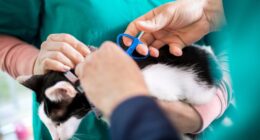Share this @internewscast.com
For most of us, our furry companions are the light of our lives and we want to know and understand everything about them.
Since our pets can’t communicate verbally, pet owners constantly watch for behavioral changes and signs to understand what their furry companions might be trying to convey, especially concerning their health.
A pet expert is now drawing attention to a very common and seemingly harmless behavior our pets display daily, which might indicate something slightly more concerning beneath the surface.
As the autumn and winter months approach, dog owners are being urged to take paw licking seriously. Harry Chapman, General Director at DotDotPet, warns that this behavior, which might seem like a charming habit, could point to underlying health problems.
The expert mentioned: “Paw licking isn’t just a cute behavior — it’s your dog signaling something significant about their health. Many owners think it’s due to boredom, but it can actually be an early indicator of discomfort or inflammation.”
With proper care, natural remedies, and preventive actions, pet owners can ensure their pets stay content and at ease as the seasons change.
Impact of chilly, damp conditions on paws
Cold and wet weather can lead to painful skin conditions, inflamed paws, and digestive issues in dogs. Continuous exposure to dampness from rain, puddles, mud, and frost can weaken the paw pads, making them susceptible to inflammation or small splits.
Moving between the frigid, soggy outdoors and cosy, heated indoors can also dehydrate your pet’s skin, causing their paws to become itchy – much like how people frequently experience cracked lips or parched hands during winter. Both situations can result in dogs constantly licking their paws to ease pain and inflammation.
Seasonal shifts affect dogs too
Just as humans experience joint stiffness in colder months, dogs also respond to seasonal changes. Paw licking often increases in dogs during autumn and winter — frequently signalling discomfort, not boredom.
Chapman shares: “Statistics show that paw licking spikes in autumn and winter. Dogs often become slower on walks and spend more time licking their paws — these are signs of discomfort, not mischief.”
Turn to natural remedies for dogs
Chapman suggests plasma supplements to combat seasonal discomfort. Plasma supplements can naturally decrease inflammation and boost skin, joint, and digestive health.
The expert shares: “These supplements reduce inflammation naturally while supporting skin, gut, and joint health. We’ve seen excellent results in dogs experiencing autumn itchiness.”
Alongside supplements, these straightforward measures can significantly improve your beloved furry companion’s paw health and help prevent seasonal discomfort:
Wash: Washing your pet’s paws following outdoor excursions is a simple and effective method to eliminate allergens or irritants that may have built up during your pet’s time outdoors.
Dry: Once rinsed, it’s imperative to dry your pet’s paws thoroughly – using eco towels is ideal. Dry the paws completely and make sure to pay special attention to the areas between your dogs toes as moisture can linger there and cause sores or irritation.
Protective balm: Before taking your dog out for a walk, apply a protective paw balm to their pads to create a moisturising barrier which will prevent irritation and cracking.
Trim paw hair: Regularly trim your dog’s paw hair and keep the fur between their paw pads trimmed short. This helps to prevent mud, dirt, snow, and ice from getting trapped and building up between their paws which can not only be uncomfortable, but also lead to irritation or infections.
Excess licking: Monitor for excessive licking and keep an eye out if there’s any change in your dog’s behaviour.
De-icing agents: In the winter, it’s crucial to watch out for de-icing agents on roads and pathways as they are highly toxic to animals if ingested – be mindful about where you take your pet for a walk.
Vet visit: Always consult a vet if any new symptoms appear.

















